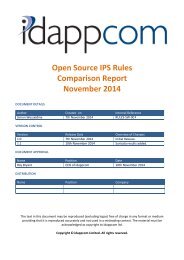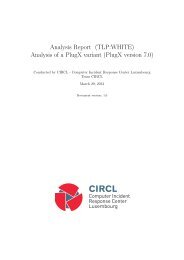The use of the Internet
The use of the Internet
The use of the Internet
Create successful ePaper yourself
Turn your PDF publications into a flip-book with our unique Google optimized e-Paper software.
CHAPTER III. POlICy AND lEGISlATIvE FRAMEwORKS<br />
<strong>the</strong>ir activities or publish information on how to make explosives or o<strong>the</strong>r substances<br />
for <strong>use</strong> in terrorist attacks. 80<br />
82. In 2008, <strong>the</strong> Government <strong>of</strong> Saudi Arabia implemented new technology-related<br />
laws, including one that established as a criminal <strong>of</strong>fence, punishable by fines and up<br />
to 10 years <strong>of</strong> imprisonment, owning a website that advocates or supports<br />
terrorism. 81<br />
83. Also in 2008, <strong>the</strong> Government <strong>of</strong> Pakistan enacted <strong>the</strong> Prevention <strong>of</strong> Electronic<br />
Crimes Ordinance, 2008, which made specific provision for <strong>of</strong>fences connected to cyberterrorism.<br />
<strong>The</strong> law is no longer in force, however. 82<br />
84. Finally, <strong>the</strong> same year saw <strong>the</strong> Government <strong>of</strong> India amend <strong>the</strong> Information<br />
Technology Act, 2000, to provide for <strong>the</strong> <strong>of</strong>fence <strong>of</strong> “cyber terrorism” (section 66F)<br />
and o<strong>the</strong>r <strong>Internet</strong>-related issues.<br />
85. Never<strong>the</strong>less, internationally, with some exceptions, in <strong>the</strong> absence <strong>of</strong> any universal<br />
instrument imposing an express obligation to enact legislation specifically targeting<br />
terrorist activity over <strong>the</strong> <strong>Internet</strong>, most Governments have elected to deal with such<br />
threats by using a mixed approach, utilizing a combination <strong>of</strong> general criminal laws, as<br />
well as cybercrime and counter-terrorism legislation. In some States, for example,<br />
criminal laws focus on substantive criminal acts without differentiating among <strong>the</strong><br />
specific means by which <strong>the</strong>y are committed. Under this approach, <strong>the</strong> <strong>Internet</strong> is<br />
regarded as merely a tool by which terrorists commit a substantive crime, <strong>of</strong>ten contained<br />
within <strong>the</strong> provisions <strong>of</strong> <strong>the</strong> national penal code.<br />
86. This is <strong>the</strong> approach in China, where <strong>the</strong> Criminal Law <strong>of</strong> <strong>the</strong> People’s Republic<br />
<strong>of</strong> China contains an article dealing with <strong>the</strong> criminalization <strong>of</strong> all illegal activities<br />
involving <strong>the</strong> <strong>use</strong> <strong>of</strong> <strong>the</strong> <strong>Internet</strong>. Article 287 <strong>of</strong> <strong>the</strong> Criminal Law makes it an <strong>of</strong>fence<br />
to <strong>use</strong> a computer in <strong>the</strong> commission <strong>of</strong> an <strong>of</strong>fence, which will be prosecuted and<br />
sentenced in accordance with <strong>the</strong> relevant criminalization and sentencing provisions in<br />
that law. In this way, under Chinese criminal law, <strong>the</strong> <strong>use</strong> <strong>of</strong> <strong>Internet</strong> is regarded as a<br />
medium or tool through which a criminal act may be committed, ra<strong>the</strong>r than an independent<br />
constituent element <strong>of</strong> <strong>the</strong> crime, and is <strong>the</strong>refore criminalized within <strong>the</strong><br />
substantive provisions <strong>of</strong> <strong>the</strong> criminal law.<br />
87. In <strong>the</strong> terrorism context, in China <strong>the</strong>re are provisions criminalizing different forms<br />
<strong>of</strong> terrorist activities, including article 120 <strong>of</strong> <strong>the</strong> Criminal Law, which criminalizes<br />
activities related to organizing, leading and participating in terrorist organizations. This<br />
broad criminalization provision covers a wide range <strong>of</strong> terrorism-related activities,<br />
including those carried out over <strong>the</strong> <strong>Internet</strong>.<br />
80 Federal Law No. (2) <strong>of</strong> 2006 on <strong>the</strong> Prevention <strong>of</strong> Information Technology Crimes, Official Gazette <strong>of</strong> <strong>the</strong> United<br />
Arab Emirates, vol. 442, 36th year, Muharam 1427 H/January 2006 (un<strong>of</strong>ficial English translation available from<br />
www.aecert.ae/pdfs/Prevention_<strong>of</strong>_Information_Technology_Crimes_English.pdf).<br />
81 David Westley, “Saudi tightens grip on <strong>Internet</strong> <strong>use</strong>”, Arabian Business, 26 January 2008.<br />
82 “Pakistan lacks laws to combat cyber terrorism”, <strong>The</strong> New New <strong>Internet</strong>, available from www.<strong>the</strong>newnew<strong>Internet</strong>.<br />
com/2010/09/01/pakistan-lacks-laws-to-combat-cyber-terrorism.<br />
29







